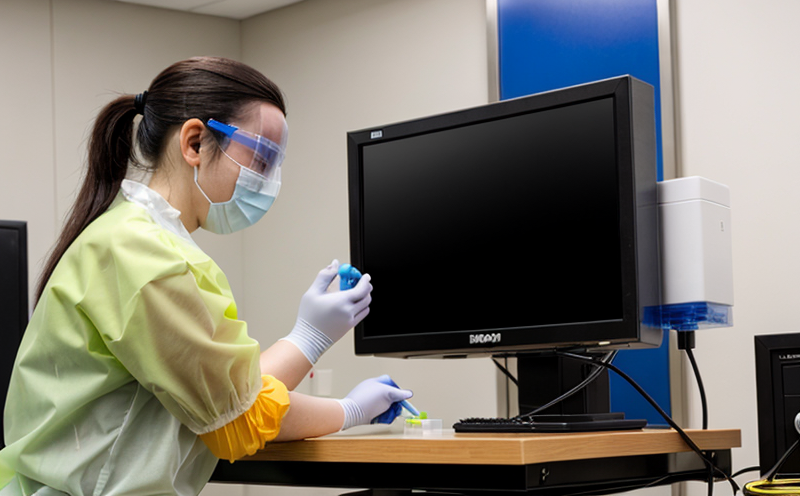Biocompatibility Testing of Prosthetic Heart Valves
The biocompatibility testing of prosthetic heart valves is a critical process ensuring that medical devices are safe and effective in the human body. This testing evaluates how materials interact with biological systems, focusing on potential adverse effects such as inflammation, toxicity, or immune response. Compliance with international standards like ISO 10993-5 (Biocompatibility—Part 5: Determination of Extractables from Medical Devices) is essential for the successful development and regulatory approval of new medical devices.
The testing involves several phases that are designed to assess different aspects of biocompatibility. Initially, extractables are determined by leaching out substances from the material under controlled conditions. This step helps identify potential compounds that could be released into the body during normal use or in case of device failure. Extraction is followed by toxicity assays using cell cultures and animal models to evaluate the cytotoxicity, genotoxicity, and subchronic systemic toxicity of these extractables.
In addition to extractables testing, short-term biocompatibility tests are conducted on the devices themselves. These include surface characterization, particle analysis, and mechanical property evaluation. Surface roughness can influence how cells interact with the material, while mechanical properties ensure that the valve performs reliably under physiological stress conditions. For prosthetic heart valves, this means assessing factors like fatigue life, strength, and durability to prevent premature failure.
Long-term biocompatibility testing is also crucial for evaluating the device's performance over extended periods. This includes accelerated aging studies to mimic long-term use in a controlled environment. By simulating real-world conditions, these tests provide insights into potential degradation products that could pose risks if released into the patient’s body.
The comprehensive nature of biocompatibility testing ensures that devices are not only safe but also effective and reliable for their intended use. This process is particularly important in the medical device sector where safety is paramount. Regulatory bodies such as the U.S. Food and Drug Administration (FDA) and the European Union's Medical Device Regulation (EU MDR) mandate these tests to ensure patient safety.
Properly conducted biocompatibility testing can significantly reduce the risk of adverse events post-market, ensuring that products meet rigorous standards for both efficacy and safety. Understanding the importance of this testing is crucial for quality managers, compliance officers, R&D engineers, and procurement specialists involved in medical device development and manufacturing.
Why It Matters
The biocompatibility testing of prosthetic heart valves matters because it directly impacts patient safety and the success of surgical procedures. When a valve fails to meet biocompatibility standards, it can lead to severe complications such as infections or thrombosis. These issues not only compromise the patient’s health but also increase healthcare costs and reduce overall quality of life.
Compliance with regulatory requirements is essential for market entry and ongoing compliance. Failure to comply can result in product recalls, legal challenges, and reputational damage for manufacturers. By adhering to biocompatibility testing protocols, companies demonstrate their commitment to patient safety and ethical manufacturing practices.
The results of these tests inform design improvements and help identify potential areas for enhancement or redesign. This iterative process ensures that medical devices continue to evolve, offering better performance and reliability over time. The benefits extend beyond individual products; they contribute to advancements in the broader field of cardiovascular medicine.
Industry Applications
| Application Area | Description |
|---|---|
| Aortic Valve Replacement | This application involves testing valves intended to replace damaged or malfunctioning aortic valves. The focus is on ensuring the valve can withstand high-pressure blood flow and maintain proper function over extended periods. |
| Tricuspid Valve Repair/Replacement | In this scenario, biocompatibility tests are conducted on valves designed for the tricuspid position in the heart. These tests ensure that the valve is compatible with the surrounding tissue and can handle the specific demands of blood flow through this part of the heart. |
| Mitral Valve Repair/Replacement | The mitral valve testing involves assessing valves that replace or repair damaged mitral valves. The goal is to ensure the valve maintains proper function, particularly in terms of opening and closing dynamics, which are critical for blood flow regulation. |
| Pulmonic Valve Replacement | This application focuses on testing valves intended for replacement of the pulmonic valve. It ensures that the new valve can withstand high-pressure pulmonary blood flow and maintain its integrity over time. |
Biocompatibility testing is essential across these applications as it guarantees that the prosthetic heart valves are safe, effective, and reliable for long-term use within the human body. This testing ensures that patients undergoing cardiovascular surgeries receive devices that meet stringent safety standards, thereby minimizing risks associated with biocompatibility issues.
Why Choose This Test
- Compliance with international standards: Adhering to ISO 10993-5 ensures that the testing process is consistent and replicable across different regions, facilitating market access.
- Rigorous evaluation of materials: By thoroughly assessing the biocompatibility of materials used in valve construction, this test minimizes the risk of adverse biological reactions.
- Early identification of potential issues: This testing allows manufacturers to identify and address any material or design-related concerns early in the development process, reducing costly rework downstream.
- Increased patient safety: Ensuring that prosthetic heart valves are biocompatible reduces the risk of complications such as infections, thrombosis, and device failure.
- Enhanced regulatory compliance: Meeting stringent testing requirements helps manufacturers comply with local and international regulations, ensuring smoother market entry and ongoing compliance.
The comprehensive nature of biocompatibility testing provides peace of mind for healthcare providers by offering reliable medical devices that are safe and effective. This focus on patient safety is crucial in the medical device sector, where quality and reliability are paramount.





